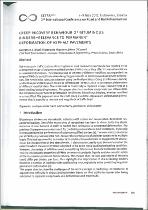 ResearchSpace
ResearchSpace
Creep recovery behaviour of bituminous binders - relevance to permanent deformation of asphalt pavements
JavaScript is disabled for your browser. Some features of this site may not work without it.
- ResearchSpace
- →
- Research Publications/Outputs
- →
- Conference Publications
- →
- View Item
| dc.contributor.author |
Mturi, George AJ

|
|
| dc.contributor.author |
Nkgapele, M

|
|
| dc.contributor.author |
O'Connell, Johannes S

|
|
| dc.date.accessioned | 2012-05-15T14:32:27Z | |
| dc.date.available | 2012-05-15T14:32:27Z | |
| dc.date.issued | 2012-05 | |
| dc.identifier.citation | Mturi, GAJ, Nkgapele, M and O'Connell, J. Creep recovery behaviour of bituminous binders - relevance to permanent deformation of asphalt pavements. 2nd International Conference on Road and Rail Infrastructure, Dubrovnik, Croatia, 7-9 May 2012, pp 335-341 | en_US |
| dc.identifier.uri | http://hdl.handle.net/10204/5859 | |
| dc.description | 2nd International Conference on Road and Rail Infrastructure, Dubrovnik, Croatia, 7-9 May 2012 | en_US |
| dc.description.abstract | The increase in traffic loads and loading time in road pavements worldwide has resulted in the widespread usage of polymer modified binders (PMBs) since they offer increased resistance to pavement distresses. The extensive use of inherently different modifiers has expanded the range of PMBs to select from when designing pavements in order to avoid pavement deformation. The new binder selection criterion using the Multiple Stress Creep and Recovery (MSCR) protocol as per ASTM D7405 is meant to differentiate the resistance to permanent deformation of different road binders. The MSCR test is essentially a repeated creep-recovery test at a fixed loading/unloading interval. This paper aims to highlight the limitations of the MSCR test but also show how creep tests can differentiate the resistance to permanent deformation for different bituminous binders, whether modified or unmodified. The paper will also illustrate creep as a time-dependent deformation phenomenon that is specific to the rate and magnitude of traffic load. | en_US |
| dc.language.iso | en | en_US |
| dc.relation.ispartofseries | Workflow;8935 | |
| dc.subject | Multiple Stress Creep and Recovery | en_US |
| dc.subject | MSCR | en_US |
| dc.subject | Asphalt pavements | en_US |
| dc.subject | Road infrastructure | en_US |
| dc.subject | Rail infrastructure | en_US |
| dc.subject | Bituminous binders | en_US |
| dc.title | Creep recovery behaviour of bituminous binders - relevance to permanent deformation of asphalt pavements | en_US |
| dc.type | Conference Presentation | en_US |
| dc.identifier.apacitation | Mturi, G. A., Nkgapele, M., & O'Connell, J. S. (2012). Creep recovery behaviour of bituminous binders - relevance to permanent deformation of asphalt pavements. http://hdl.handle.net/10204/5859 | en_ZA |
| dc.identifier.chicagocitation | Mturi, George AJ, M Nkgapele, and Johannes S O'Connell. "Creep recovery behaviour of bituminous binders - relevance to permanent deformation of asphalt pavements." (2012): http://hdl.handle.net/10204/5859 | en_ZA |
| dc.identifier.vancouvercitation | Mturi GA, Nkgapele M, O'Connell JS, Creep recovery behaviour of bituminous binders - relevance to permanent deformation of asphalt pavements; 2012. http://hdl.handle.net/10204/5859 . | en_ZA |
| dc.identifier.ris | TY - Conference Presentation AU - Mturi, George AJ AU - Nkgapele, M AU - O'Connell, Johannes S AB - The increase in traffic loads and loading time in road pavements worldwide has resulted in the widespread usage of polymer modified binders (PMBs) since they offer increased resistance to pavement distresses. The extensive use of inherently different modifiers has expanded the range of PMBs to select from when designing pavements in order to avoid pavement deformation. The new binder selection criterion using the Multiple Stress Creep and Recovery (MSCR) protocol as per ASTM D7405 is meant to differentiate the resistance to permanent deformation of different road binders. The MSCR test is essentially a repeated creep-recovery test at a fixed loading/unloading interval. This paper aims to highlight the limitations of the MSCR test but also show how creep tests can differentiate the resistance to permanent deformation for different bituminous binders, whether modified or unmodified. The paper will also illustrate creep as a time-dependent deformation phenomenon that is specific to the rate and magnitude of traffic load. DA - 2012-05 DB - ResearchSpace DP - CSIR KW - Multiple Stress Creep and Recovery KW - MSCR KW - Asphalt pavements KW - Road infrastructure KW - Rail infrastructure KW - Bituminous binders LK - https://researchspace.csir.co.za PY - 2012 T1 - Creep recovery behaviour of bituminous binders - relevance to permanent deformation of asphalt pavements TI - Creep recovery behaviour of bituminous binders - relevance to permanent deformation of asphalt pavements UR - http://hdl.handle.net/10204/5859 ER - | en_ZA |





